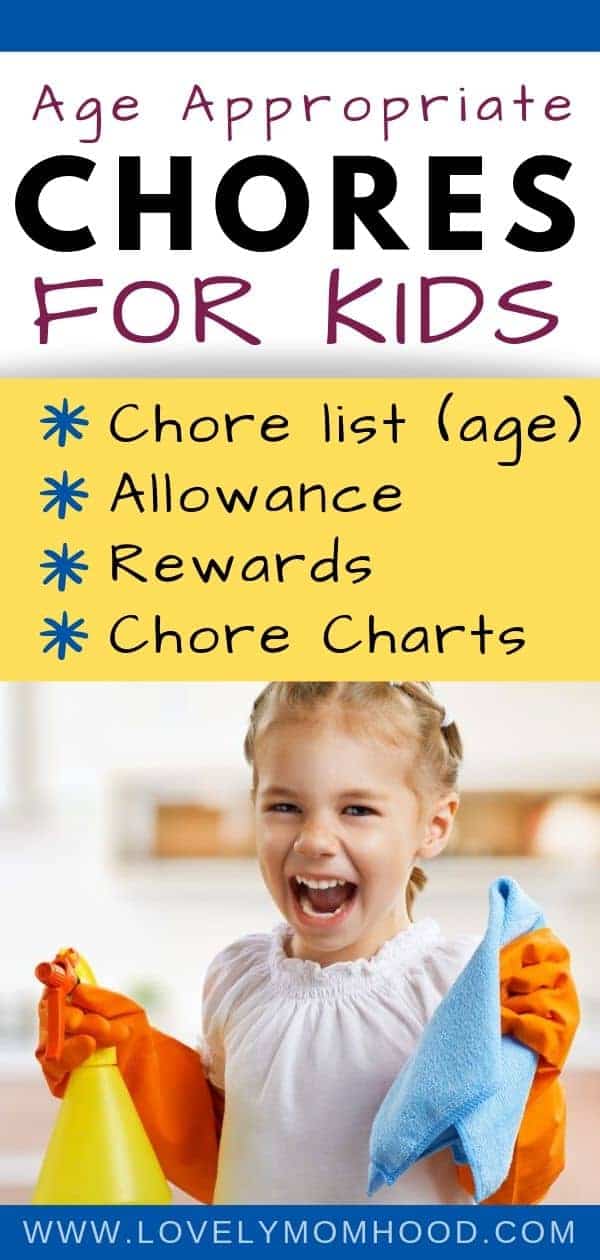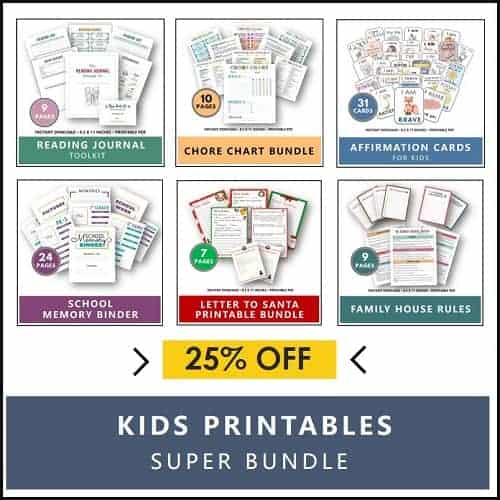Chores for Kids by Age (Age-Appropriate Kids Chores and Allowance List)
Wondering why chores for kids are so crucial and which kid’s chores are age appropriate for your children? Read on…
But, before we get into the kid chores list, let’s cover some important considerations.

* This post contains affiliate links. Click here for more info.
Why assign chores to children?
Chores play a major role in our children’s foundation.
Studies have shown that children who do chores early on, “have higher self-esteem, are more responsible, and are better able to deal with frustration and delay gratification, all of which contribute to greater success in school”. (Source)
Learning responsibility from childhood ensures that later in life our children:
- are self-efficient
- are more responsible
- learn how to contribute
- are more grateful
In addition, having chores and completing them give our kids a sense of pride and accomplishment.
It helps them feel important, appreciated, needed, and a valuable part of the family nucleus.
It teaches team how to be part of a team and the importance of their contribution. Chores not only teach them how to be responsible by doing things for themselves, but also compassion and consideration for others (their parents).
In other words, chores for kids are a MUST!
Age Appropriate Chore Assignments
As important as chores are, it is also important to ensure we are assigning age appropriate tasks.
Because our children develop different skills with age, assigning them with chores they aren’t ready for may cause frustration and irritability.
The chores for kids list in this article will give you a pretty good idea as to which children chores might be appropriate for your child.
However, all kids are different. Some mature and develop more rapidly than others and they might be able to handle a little more despite their age.
That is why is it best that you select chores for your child that are not only age appropriate, but that are a good fit for their developmental stage.
Another thing to take into consideration is your family dynamic.
Some children, especially older ones, might have other responsibilities outside of the home.
So, putting it all into perspective, here are a few things to consider when you are selecting chores for your children:
- their age
- their developmental stage
- the number of children you have and how you can divide responsibilities
- other responsibilities they might have (e.g. sports, extracurricular activities, musical instrument practice, etc.)
Make a Chore Chart
Chore charts are extremely important in helping you and your kids stay organized.
A chore chart sets expectations and serves as motivation to get things done in a timely manner.
Here is how to go about it:
- Start by creating a list of chores that align with your family’s dynamic
- Remember to choose age appropriate chores for your kids
- Assign chores to each child
- Plug them in to a weekly calendar
- Add allowance amount and/or reward (if applicable)
Now, there are parents that like to chart every single daily routine in children’s chart such “brush your teeth and brush your hair”.
Although they might be beneficial for younger kids, they aren’t necessarily chores, they are daily necessities. Therefore, making them part of a daily routines chart instead is a better idea.
Note: If you would like to implement a Chores and Rewards System that works then consider the Chores Toolkit Bundle!
With the Chores Bundle Toolkit you will receive a 10-Page PDF containing:
- Step-by-Step Instructions
- Chores and Allowance Master List
- Chore Chart (Daily/Weekly Tracker)
- Reward Systems Guide
- 50 Reward Ideas
- My Reward Ideas Brainstorm Page
- Chore Bucks Cutouts ($1, $3, $5,$10)
- No-Chores Coupon Cutouts (1-Day, 3-Day, 5-Day)
You can learn more here!
Chore Instruction and Expectations
It is important to set expectations and chore rules from the beginning.
Before you start implementing daily and weekly chores for your kids, ensure you sit your kids down and have a “chore meeting”.
Use that time to discuss the chore chart, expectations, and rewards.
Allow them to ask questions and ask them questions as well.
In addition to expectations and rewards, teach them how to perform the chores assign to them by demonstrating it a few times.
Don’t just assume your children know how to do something because they have “done it before”.
This is especially true for younger children.
By doing it together the first time they will not only learn the correct way of doing chores, but it will motivate them to do them even more.
So, remember:
- show them how to do the chores on their list correctly
- help them do it a few times if they need help
- allow them to do then alone
By doing it this way you won’t need to micromanage them because you know they will be doing it exactly how you taught them.
Related Article: How to Create Family House Rules (50 Rules and Printable)
Granting Allowance and Rewards for Chores
So, the big question… Should I give my kids an allowance for doing chores?
Yes and no.
Let me explain…
Daily shores such as making their bed, taking their dirty clothes to the hamper and taking the dishes to the sink are responsibilities that are expected of them.
In addition, other chores such as feeding the dogs, taking their folded clothes to their drawers, and setting the table are part of their contribution to the family nucleus.
Therefore, these chores for kids should not be done for monetary compensation, in my opinion and that of many other experts.
Another way to offer positive reinforcement to your children by keeping up and completing chores is to offer them rewards.
CHORE REWARDS
You can always opt to reward your child weekly with something they like as an incentive for good behavior and for being responsible (go out for ice cream or buy them a book).
This is especially true for younger kids who are just starting to learn about responsibility and duties.
Chore Rewards can be anything you consider appropriate for their age and they can be given at the end of the week.
You can brainstorm with your children as to what the rewards should be. Discussing rewards with them will motivate them to get their chores done on time.
Here are some examples of chore rewards for younger kids:
- out for ice cream
- a book of their choice
- a toy under $10
- new game for their tablet
CHORE ALLOWANCES
Typically, an allowance is a set amount of money that a parent grants their child on a weekly/monthly basis. The idea of an allowance is to help the child learn to receive, save, and manage their own earnings, thus learning the value of money.
However, was the allowance really “earned”? Therefore, how much are they really learning about “money value?”
That is where Chore Allowances come in! If an allowance is granted without labor, in other words “just because”, the child by default it is less likely to value this asset. On the other hand, if they work for their allowance, it allows for money appreciation and value.
Instead of an allowance think of it as a “commission” or a “compensation”. If they complete the work that is expected of them, they will receive a commission. Simple.
With that said…..
Allowances work best for older kids who already know how to be responsible. Chores for allowance should be those that are a bit more task specific and more difficult in nature.
Important: Basic, everyday tasks should not be compensated as they are part of their responsibility as a member of the family.
Allowance also help kids; especially young adults, manage money and learn to appreciate it!
Examples of kids’ chores that might include an allowance or are pulling weeds, tutoring siblings, babysitting siblings, cleaning toilets, dusting blinds…etc.
Example of allowance or compensations methods include:
- Weekly set allowance for completing weekly chores and extra tasks
- Pay-per-chore basis on chores that are deeded “money earners” (not daily, expected chores)
Please note allowances, allowance amount, and type of rewards is up to parental discretion.
Every family has their own budget, family dynamic, and standards.
The following Chores for Kids and Allowance List is just a guideline and can be customizable and flexible to fit all families and their needs.
Age Appropriate Chores for Kids List and Allowance

Remember, the following chores for kids’ ideas and the allowance amount are just guidelines.
Create an age appropriate chores list for every child by picking the chores that work best for your family dynamic.
Then, create a chore chart and discuss it with your kids. Don’t forget to set expectations and to discuss rewards and allowance if applicable.
But, wait… before you go wasting time writing these down (cause there is a lot to write) simply download a FREE printable copy of Chores and Allowance List for Kids of All Ages and you are
Toddler Chores
- Put away toys
- Take plates and utensils to sink after every meal
- Dirty clothes to hamper
- Pile books
- Dust
Pre-K to 7-Years-Old
- Put away toys
- Clean room
- Make bed
- Organize shoes
- Put clean folded clothes away
- Dirty clothes to hamper
- Take food ware to sink after every meal
- Sweep
- Pull weeds $2
8 to 11-Years-Old
- Clean room
- Make bed
- Take old bed sheets to laundry/ Put on new bed sheets
- Wash dishes
- Take plates and utensils to sink after every meal
- Set the dinner table
- Make own snacks
- Put clean folded clothes away
- Dirty clothes to hamper
- Water plants
- Dust
- Clean windows
- Sweep
- Dust
- Feed pets (food and water)
- Clean mirrors $1
- Wipe tables $1
- Wipe counters $1
- Clean windows $1
- Vacuum $3
- Pull weeds $3
- Rake leaves $3
Related Article: Full List of Age-Appropriate Chores for 8-10 Year Olds
12 to 18-Years-Old
- Clean Room
- Make bed
- Take old bad sheets to laundry/ Put on new bed sheets
- Wash dishes
- Put away clean dishes
- Loading/unloading dishwasher
- Throw away trash (kitchen and bathroom)
- Clean mirrors
- Wipe tables
- Wipe counters
- Dust
- Vacuum
- Sweep
- Wash clothes
- Fold clothes
- Put clean folded clothes away
- Dirty clothes to hamper
- Rake weeds
- Water plants
- Check mail
- Feed pets (food and water)
- Walk the dog/s
- Pooper-scooper duty
- Set the dinner table
- Clear and clean table after dinner
- Mop $3
- Clean showers and bathtubs $3
- Pull weeds $5
- Clean Toilets $5
- Make lunches and/or snacks for siblings $5
- Tutor younger siblings/ homework helper $7/hr
- Babysit younger siblings $7/hr
- Mow the lawn $10
- Wash car $10
RELATED SCHOOL AGE KIDS ARTICLES:
- How to Organize School Paper with a School Memory Binder (Printables)
- How to Create an At-Home Learning Routine and Printable Schedule
- 37 Fun Indoor Games and Activity for Kids
- Where to Find Super Cheap Kids’ Books (50%-90% OFF List Price)
- 7 Stress-Free School Morning Routine Hacks for Parents
- 5 Tips to Help Your Child Develop Great Homework Habits
Final Thoughts
Assigning kids with chores is one of the best ways to teach them responsibilities and to set a strong foundation into adulthood.
Don’t forget to assign them tasks that match their developmental phase and to walk them through the steps on how to do them.
Discuss expectations and rewards… and always, and I mean always, be encouraging and supportive once they complete their chores. Positive reinforcement whether verbal or physical is key!
What kids’ chores did your parents make you do? Did they pay you an allowance?
Don’t forget to pin for later…



